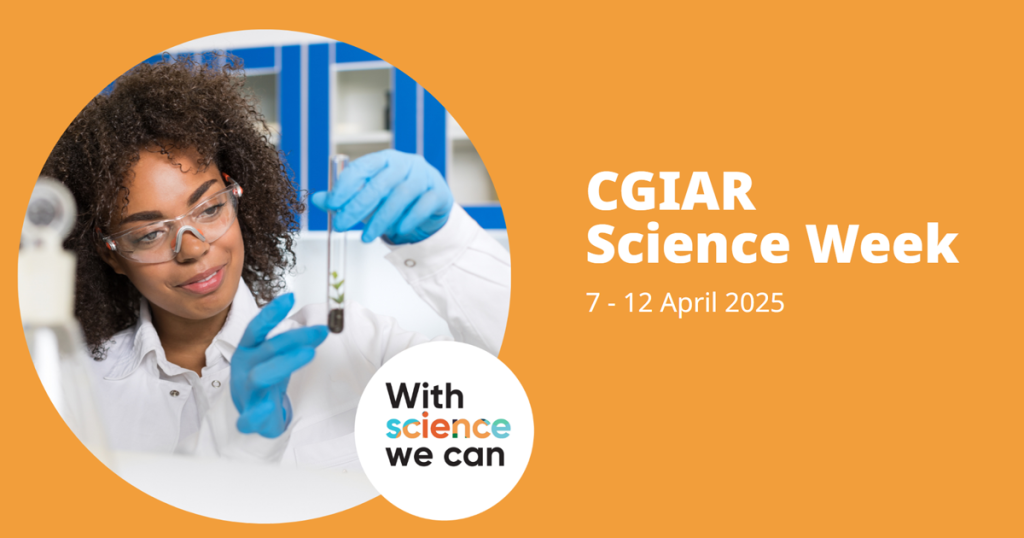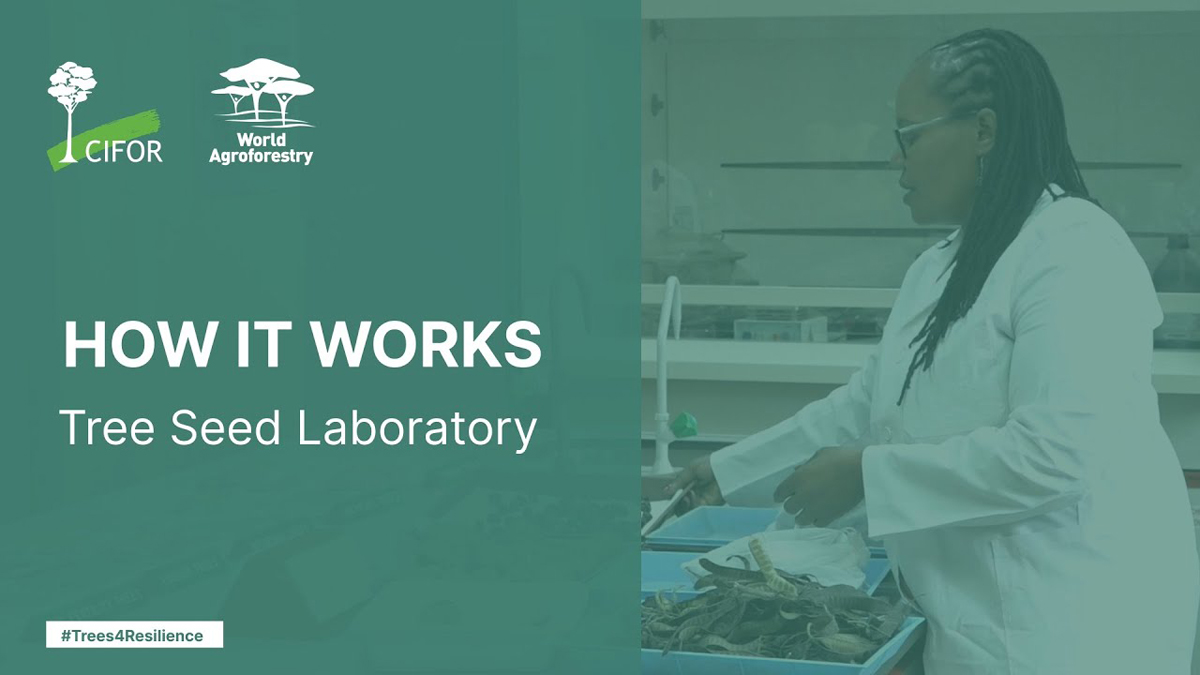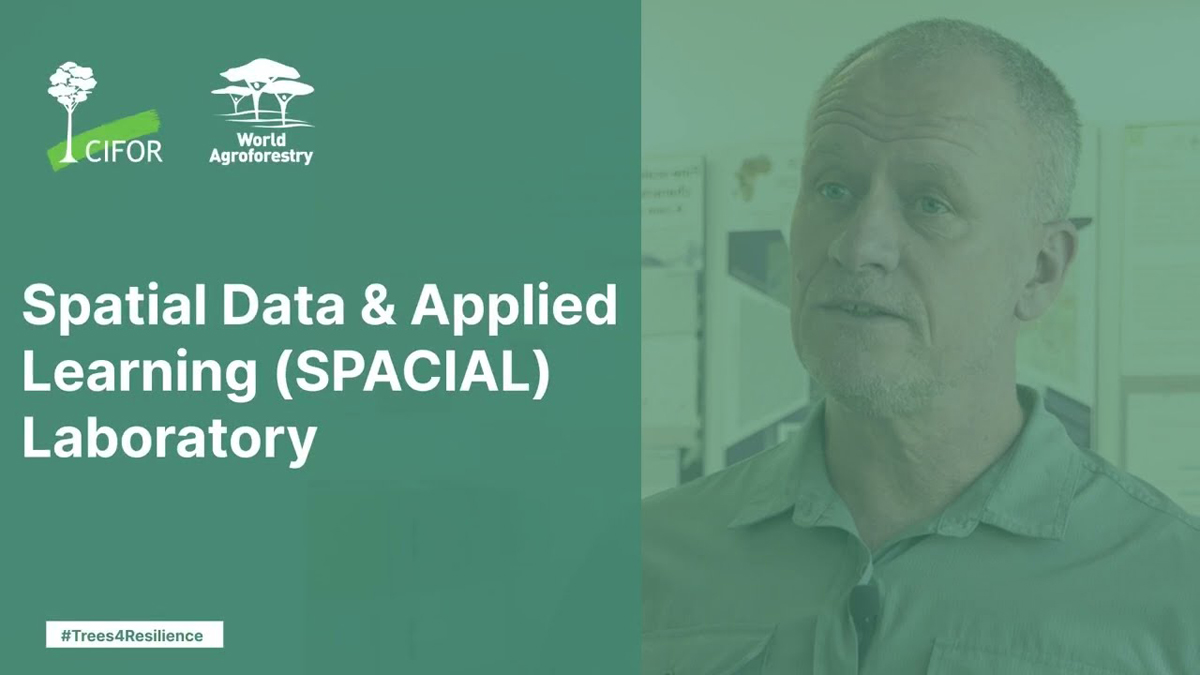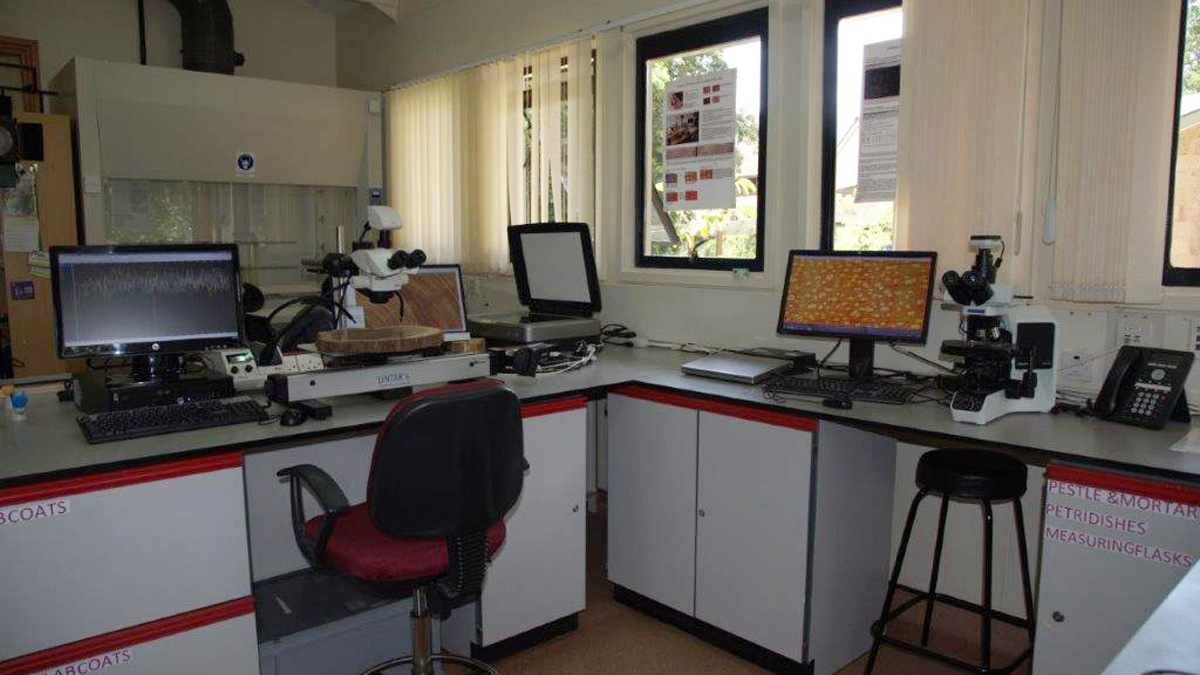
CIFOR-ICRAF is taking part in the inaugural CGIAR Science Week! This conference will engage the community of global leaders in research, policy, and development working for a food, nutrition, and climate secure future in active dialogue during plenary sessions focused on harnessing and scaling science and innovation. CIFOR-ICRAF will offer the opportunity to see, first-hand, its transformative innovations improving the lives of communities and to visit its cutting-edge labs to see science in action.
Welcome Reception
The event will serve as a networking platform, bringing together key stakeholders from government, science, policy and industry sectors to foster collaborations for a sustainable and resilient future.
Research Workshop – Gathering for Growth: A Unified Vision for Adapted Crops and Soils (Opportunity Crops)
This session will bring together the CGIAR Research Centers working under the VACS initiative, highlighting the recent key achievements and investments in coordination and implementation. The aim is to catalyze the ongoing and future work under the CGIAR VACS Portfolio as part of the VACS Implementers Group.
Launched in 2023, VACS is an initiative to diversify and enhance resilience of agrifood systems through climate-adapted and nutritious opportunity crops grown on healthy soils.
The VACS governance structure led by the Joint Partnership between the Food and Agriculture Organization of the United Nations (FAO) and CIMMYT on behalf of the CGIAR focuses on maximizing collective impact, aligning efforts, and promoting transparency with the goal to grow and strengthen the initiative. VACS leverages the complementary capabilities and networks of the CGIAR Research Centers, catalyzing actions across a wide range of public and private stakeholders aligned with the Theory of Change, This is accomplished through various areas of action, such as Breeding, Seed Systems, Conservation, Public-Private Partnerships, Soils, Smallholder Farmers’ Resilience, and Capacity Building, which align with the CGIAR Science Programs.
The implementation of VACS is designed to achieve the above goals through an Implementers Group made up of CGIAR, FAO, IFAD, and Crop Trust.
Exhibition: Trees for Resilience
The exhibition will highlight the contribution of trees to transforming food systems and building the resilience of communities to climate change. It will feature digital solutions that help farmers restore degraded lands, improve agricultural productivity and achieve food security. In addition, it will display seedlings, tree-based products, and knowledge resources that highlight the practical applications of agroforestry for land restoration and improved livelihoods. Visitors will also get a chance to engage directly with CIFOR-ICRAF scientists and gain insights into the importance of planting the right tree, in the right place, and for the right purpose. This will help them understand how trees can combat climate change, enhance biodiversity, and strengthen food systems.
Exhibition: Trees for Resilience
The exhibition will highlight the contribution of trees to transforming food systems and building the resilience of communities to climate change. It will feature digital solutions that help farmers restore degraded lands, improve agricultural productivity and achieve food security. In addition, it will display seedlings, tree-based products, and knowledge resources that highlight the practical applications of agroforestry for land restoration and improved livelihoods. Visitors will also get a chance to engage directly with CIFOR-ICRAF scientists and gain insights into the importance of planting the right tree, in the right place, and for the right purpose. This will help them understand how trees can combat climate change, enhance biodiversity, and strengthen food systems.
Participatory Research for Sustainable and Inclusive Transformations in Food, Land, and Water Systems
Achieving sustainable, equitable, and climate-resilient food, land, and water systems requires the active participation of diverse stakeholders in co-creating solutions. This interactive session explores how participatory research approaches—ranging from living labs and multi-stakeholder platforms to citizen science and gender-transformative methodologies—are driving social change and advancing resilient multifunctional landscapes.
By fostering collaboration between researchers, policymakers, communities, and innovators, participatory research strengthens collective agency, enhances decision-making, and enables context-specific innovations that address complex challenges such as land degradation, biodiversity loss and food insecurity.
Participants in this session will engage with practical tools and real-world examples from CGIAR initiatives.
Agenda:
- Opening and framing presentation
- Introductions to participatory research approaches used within CGIAR initiatives, examples and case-studies
- Engage with concrete tools from the Agroecological Living Landscapes toolkit and with digital innovations in citizen science in a marketplace setting
- Closing remarks
Speakers:
- Anne Rietveld (Lead AoW5 SP-Multifunctional Landscapes, Alliance Bioversity-CIAT)
- Jacob van Etten (Director, Alliance Bioversity-CIAT)
- Jasper Kleinsmann (Remote Sensing Scientist, CIFOR-ICRAF)
- Jon Hellin (Senior Scientist, IRRI)
- Kingsly Ofosu-Ampong (Scientist, Alliance Bioversity-CIAT)
- Lisa Fuchs (Scientist, Alliance Bioversity-CIAT)
- Lulseged Desta (Lever Director and Lead SP-Multifunctional Landscapes, Alliance Bioversity-CIAT)
- Mariangel Garcia Andarcia (Research Group Leader – Water Futures Data & Analytics, IWMI)
- Rosina Wanyama (Scientist, Alliance Bioversity-CIAT)
- Ryan Nehring (Research Fellow, IFPRI)
- Sarah Freed (Co-lead AoW5 SP-Multifunctional Landscapes, Alliance Bioversity-CIAT)
- Sieglinde Snapp (Program Director, Sustainable Agrifood Systems, CIMMYT)
- Thomas Falk (Scientist, IFPRI)
- Wei Zhang (Lead AoW4 SP-Multifunctional Landscapes, IFPRI)
Exhibition: Trees for Resilience
The exhibition will highlight the contribution of trees to transforming food systems and building the resilience of communities to climate change. It will feature digital solutions that help farmers restore degraded lands, improve agricultural productivity and achieve food security. In addition, it will display seedlings, tree-based products, and knowledge resources that highlight the practical applications of agroforestry for land restoration and improved livelihoods. Visitors will also get a chance to engage directly with CIFOR-ICRAF scientists and gain insights into the importance of planting the right tree, in the right place, and for the right purpose. This will help them understand how trees can combat climate change, enhance biodiversity, and strengthen food systems.
Plenary 3, Segment 1: Targeting Transformation – Africa
This plenary session will explore transformative strategies and innovations driving agricultural resilience and sustainability across Africa, Latin America, and the Caribbean (LAC). In Africa, the discussion will center on key regional commitments, including the African Union’s Comprehensive Africa Agriculture Development Programme (CAADP) outcomes and the Kampala Declaration. It will examine how CGIAR’s 2030 Research and Innovation strategy aligns with these frameworks, leveraging science and technology to address complex challenges and advance resilience and prosperity. Meanwhile, in LAC, the session will highlight how initiatives like AgriLAC Resiliente—CGIAR’s regional initiative—have been integrated into agri-food innovation systems to strengthen competitiveness, enhance food and nutritional security, and mitigate climate and environmental challenges. By fostering networks of collaboration and scaling impactful solutions, this session will showcase the role of cutting-edge research in shaping a sustainable agricultural future across both regions.
Segment 1: Targeting Transformation – Africa
- Sequence 1.1: Panel Discussion: Embracing Regional Targets (AU/CAADP & Kampala commitments)
- Sequence 1.2: Panel Discussion: 2050 vision for Africa: a dialogue between CGIAR leaders and some key partners
- Sequence 1.3: Panel Discussion: Transforming Africa’s Food Systems: Vision and Leadership
Africa stands at a pivotal moment, confronting a confluence of challenges amid ambitious regional commitments and urgent calls for action. The plenary session titled “Targeting Transformation – Africa” within CGIAR Science Week serves as a beacon of collaboration and innovation in response to these pressing issues.
The session will delve into the core pillars of Africa’s transformation agenda, drawing from key regional commitments such as the African Union’s Comprehensive Africa Agriculture Development Programme (CAADP), the newly adopted Kampala Declaration among many others.
Amidst these commitments, the session will spotlight strategies and innovations imperative for navigating Africa’s complex challenges. It will explore how CGIAR’s 2030 Research and Innovation strategy aligns with and bolsters these regional frameworks, positioning science and technology as linchpins in Africa’s journey towards resilience and prosperity.
As Africa charts its course towards 2050, this segment serves as a platform for envisioning a future where sustainable development, resilience, and prosperity are not just aspirations but tangible realities for all its people. Through collective action and unwavering commitment, we endeavor to target transformation and unlock Africa’s boundless potential.
Speakers:
- Éliane Ubalijoro (CEO, ICRAF-CIFOR)
BBC’s CrowdScience
The BBC World Service radio show CrowdScience takes listeners’ questions about life, Earth and the universe to researchers who are hunting for answers at the frontiers of knowledge.
In this special CrowdScience event we ask: Can We Feed Everybody?
Join hosts Anand Jagatia and Alex Lathbridge, and panellists Lindiwe Sibanda, Alex Awiti and Sieglinde Snapp to explore sustainability in farming.
We’ll tackle questions on the subject from the audience and our listeners around the world.
Please register in advance to book your seat.
The BBC World Service reaches millions of listeners around the world. The event will be recorded live and broadcast later. After broadcast, it will also be available to listen on the BBC website.
Speakers:
- Alex O. Awiti (Principal Scientist & Agroecology Lead, CIFOR-ICRAF)
- Lindiwe Sibanda (Chair, CGIAR Integrated Partnership Board)
- Sieglinde Snapp (Sustainable Agrifood Systems Program Director (SAS), CIMMYT)
Exhibition: Trees for Resilience
The exhibition will highlight the contribution of trees to transforming food systems and building the resilience of communities to climate change. It will feature digital solutions that help farmers restore degraded lands, improve agricultural productivity and achieve food security. In addition, it will display seedlings, tree-based products, and knowledge resources that highlight the practical applications of agroforestry for land restoration and improved livelihoods. Visitors will also get a chance to engage directly with CIFOR-ICRAF scientists and gain insights into the importance of planting the right tree, in the right place, and for the right purpose. This will help them understand how trees can combat climate change, enhance biodiversity, and strengthen food systems.
Field Trip: CIFOR-ICRAF Research and Innovation Laboratories
Join us at CIFOR-ICRAF and learn how trees can make a difference for climate, biodiversity and food security. Tour our four cutting-edge laboratories that are providing solutions to global challenges.
A New Chapter for CAADP: The Kampala CAADP Declaration and CAADP Strategy and Action Plan, 2026-2035
Since its launch in 2003 in Maputo and renewal in 2014 in Malabo by African Union (AU) Heads of State and Government, the Comprehensive Africa Agriculture Development Programme (CAADP) has promoted evidence-based decision-making and performance monitoring of Africa’s agricultural transformation, food security and nutrition, economic growth, and prosperity for all. After two decades of CAADP implementation, the continent has made enormous progress in terms of expansion of public investments in agriculture and intra-African agricultural trade, agricultural and economic growth, and improvement in poverty and nutrition outcomes. But progress has been uneven, significant challenges remain, and new ones have come to the fore. The COVID-19 pandemic, for example, interrupted economic growth and caused deterioration in hunger and nutrition outcomes, and the Russia-Ukraine war created supply chain and other trade shocks. The slowdown in growth has been compounded by the effects of climate change, including extreme weather events, conflicts, and other pest infestations such as locust and fall armyworm across the continent.
Speakers:
- Simeon Ehui (Director General, IITA)
- Johan Swinnen (Director General, IFPRI)
- Baboucarr Manneh (Director General, AFRICARICE)
- Bram Govaerts (Director General, CIMMYT)
- Simon Heck (Director General, CIP)
- Aly Abousabaa (Director General, ICARDA)
- Éliane Ubalijoro (CEO, ICRAF-CIFOR)
- Himanshu Pathak (Director General, ICRISAT)
- Apollinaire Djikeng (Director General, ILRI)
- Yvonne Pinto (Director General, IRRI)
- Mark Smith (Director General, IWMI)
- Jonathan Mueke (Principal Secretary in the State Department for Livestock Development, Ministry of Agriculture and Livestock Development, Kenya)
- Estherine Fotabong (Director of Agriculture, Food Security and Environmental Sustainability, AUDA-NEPAD)
- Godfrey Bahiigwa (Director of Rural Economy and Agriculture, AUC)
- Huyam Ahmed MohammedElamin Salih (Director of the AU Inter African Bureau for Animal Resources, AU-IBAR)
- Felicitas Röhrig (Senior Policy Officer, German Federal Ministry for Economic Cooperation and Development (BMZ))
- Steven Were Omamo (Director of Development Strategies and Governance, and Acting Director for Africa, IFPRI)
- Samuel Benin (Senior Research Fellow, IFPRI)
- Kwesi Atta-Krah (Consultant and Senior Advisor to the CGIAR Africa Director, IITA)
- Jörn Schmidt (Director for Sustainable Aquatic Food Systems, WorldFish)
- Wanjiru Kamau-Rutenberg (Managing Director for Africa, Alliance of Bioversity International and CIAT)
Science Talks: Unpacking the status of women in African agrifood systems
The yawning gender gap in African agrifood systems and women farmers’ low uptake of climate resilient innovations continue to hinder Africa’s capacity to cope with climate change. Further, these gender gaps1 continue to deeply undermine rural women’s ability to contribute to and benefit from agricultural innovations. In Africa, where agriculture holds the largest transformative potential with most economies being dependent on agriculture, the gender gap is costing these economies massive losses, stifling food systems transformation. Meaningful, impactful action toward bridging these gaps requires compelling, actionable evidence for practice and policy action.
Together with the CGIAR GENDER Impact Platform, African Women in Agricultural Research and Development (AWARD) will convene this event to present up-to-date data and discuss Africa-specific recommendations and strategies for gender transformative solutions that can drive equitable agri-food systems. The session will be anchored on a forth coming report on the ‘‘The Status of Women in African Agrifood Systems’, that will analyze evidence on women’s role in agri-food sectors in the African context.
Exhibition: Trees for Resilience
The exhibition will highlight the contribution of trees to transforming food systems and building the resilience of communities to climate change. It will feature digital solutions that help farmers restore degraded lands, improve agricultural productivity and achieve food security. In addition, it will display seedlings, tree-based products, and knowledge resources that highlight the practical applications of agroforestry for land restoration and improved livelihoods. Visitors will also get a chance to engage directly with CIFOR-ICRAF scientists and gain insights into the importance of planting the right tree, in the right place, and for the right purpose. This will help them understand how trees can combat climate change, enhance biodiversity, and strengthen food systems.

















